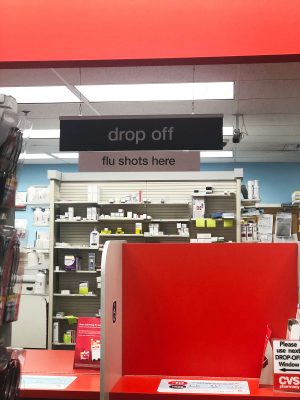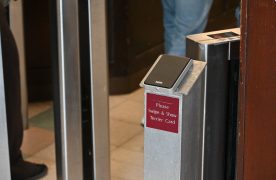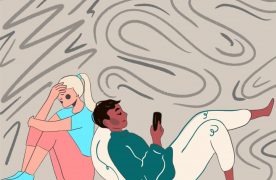
The Lowell Community Health Center issued a warning notice Saturday after a child was diagnosed with measles.
Clare Gunther, chief development and communications officer at the Lowell Community Health Center, said the patient was isolated upon diagnosis Nov. 8, and the center has taken steps to minimize exposure to other patients and center staff.
“We identified what areas of the building this patient had been to,” Gunther said, “and who might have been exposed as a result.”
With a slew of patients in the center daily, Gunther said it was difficult for the staff to track down who had been exposed to the infected patient. However, she said the Center is doing its best to provide its patients with quality healthcare services.
“We’re a health center,” Gunther said. “We have 30,000 patients, so, I mean, people have a variety of different illnesses.”
Gunther explained that measles is an airborne virus that lives for two hours. So, she said, if someone entered a room over two hours after someone who was infected with measles, they would not be affected.
The center examined its patient list, she said, to determine who had a measles vaccine on their record and which patients had a positive titer — a blood test that show if a patient is immune to the disease. Patients who were at-risk were encouraged to be vaccinated, and, Gunter said, as far as the center is aware, no one else has been infected.
“You can never say definitively,” Gunther said. “They were immediately isolated upon diagnoses, so we took steps to minimize exposure.”
Gunther said Massachusetts has a very high rate of immunization. The state made vaccinations for measles, mumps and rubella a mandatory step for children to start at public schools, she explained, and the older generation is less likely to be affected by the measles virus.
“People born in the U.S. before 1957 tend to be immune because there was no vaccine prior to that time, so they were exposed to or had measles,” Gunther said. “There’s a small subset of people who are really at risk, so the main thing is just people need to get vaccinated.”
Brighton resident John Kent, 26, said he was unaware of the new case of measles in Massachusetts and said people who are sick should not expose others to their illnesses.
“When people are sick, they should stay at home,” he said. “Don’t be going to work, going to school and things like that. You know, getting your colleges and classmates sick.”
Wendy Parmet, director of the Northeastern University’s Health Policy and Law program, said that measles infections have gone down considerably since the creation and use of vaccines. Now, she said it is within communities of unvaccinated individuals that outbreaks are occuring.
“Measles deaths had gone way down in this country,” Parmet said, “and now, with pockets of communities not being vaccinated, we’re seeing new outbreaks”
With other illnesses like the flu, she said, vaccination remains one of the most effective ways to prevent the illness and mitigate its impact.
Vaccination is important, Parmet said, but basic hygiene is also necessary to prevent the spread of disease. She said washing hands and staying home when sick are also important for stopping the spread of diseases.
Parmet explained that individual vaccines are not a perfect solution, however, which is why she said she thinks people should get vaccinated for the flu annually to stay protected against changing diseases.
“The problem with the flu vaccine is the flu keeps changing, so you need to get a new vaccine each year,” Parmet said. “A measles vaccine lasts a lot longer, but vaccination is still the key.”
Parmet said flu symptoms can be difficult to detect early on, so people might not realize that they have the illness. She said this is a problem because someone who does not realize they are sick can continue on with their daily life, accidentally infecting colleagues and family members.
Pornmanie Snidvongs, 22 of Kenmore, said, though she rarely gets vaccinated, she thinks being aware of one’s surroundings and taking preventative actions during flu season are important for staying healthy.
“Being aware of what’s going on and being conscious what you should do,” Snidvongs said, “that kind of stuff [is important].”
Amy Nurnberger, 45, of Fenway, said she agrees that vaccination is an important way to protect against serious diseases.
“If you don’t get an immunization, it’s more likely to happen,” Nurnberger said. “I do, rather, think immunizations are important, and measles is a dreadful disease. It can have really long-term effects on the child.”
Jennifer is studying Communication Studies at the College of Communication in the Class of 2020. She has written for multiple publications and practiced digital marketing throughout her time at Boston University. In Jennifer's spare time, she likes going to brunch and solving puzzles. Connect with her on Twitter at @JSuryadjaja














